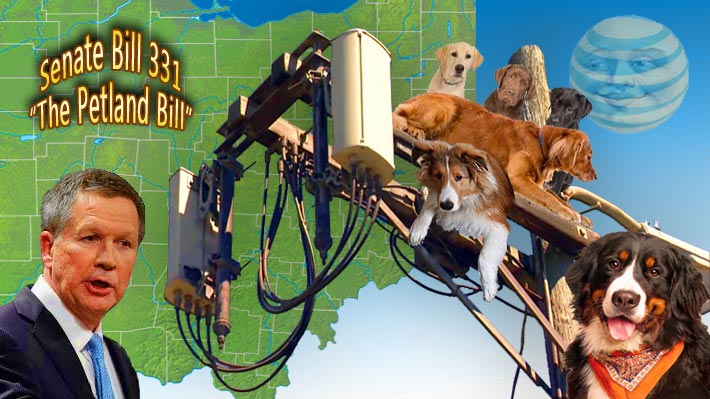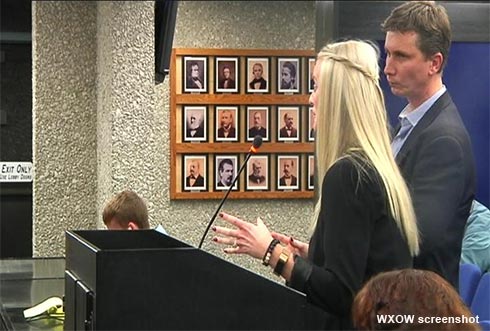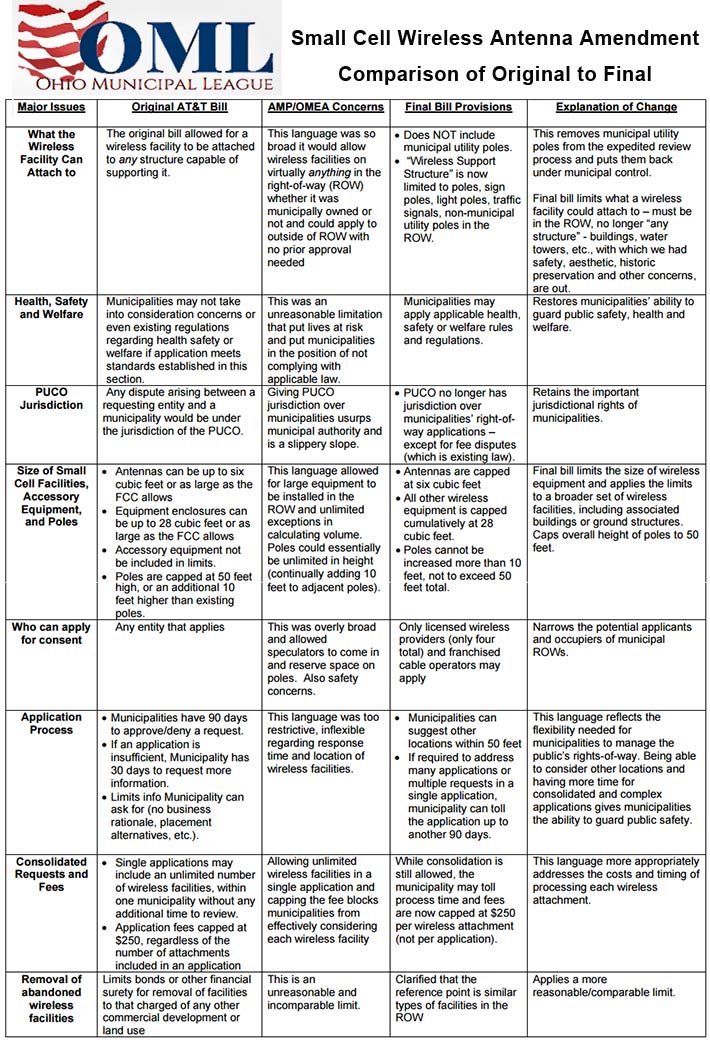
Ohio Governor John Kasich signed the “Petland Bill” on Dec. 19, 2016, restricting where pet stores could get the animals they sell. Tucked into the lame duck bill at the last minute were sweeping reforms sponsored by AT&T to expedite the telecom permitting process in the rights of way of the State’s 938 municipalities.
DAS-provider Mobilitie LLC’s petition to the FCC for a declaratory ruling to promote broadband in the U.S. by prohibiting excessive charges for access to public rights of way was championed by AT&T, at least in Ohio, where the carrier last month lobbied for and successfully sneaked in an amendment inside a bill regulating puppy mill providers.
The questionable legislative procedure is called “logrolling” and it may be illegal.
It passed, and effective March 21, 2017, the maximum amount that can be charged must be the lesser of $200 annually per attachment or the actual, direct, and reasonable costs related to the use of the wireless support structure in the rights of way for all of Ohio’s 938 communities.
In its FCC petition, Mobilitie had cited an instance in Texas where a community wanted an annual $20,000 fee for a new pole in a right of way, and $2,000 annually for each pole, even where the attachment would require no disturbance of the underlying right of way.
And although all four major carriers serving Ohio, AT&T, Verizon, Sprint and T-Mobile, are most likely thrilled with the passage of Senator Bob Peterson’s “Petland Bill,” SB 331, Mobilitie might be ruing the idiom, be careful what you ask for.
According to Ohio Municipal League (OML) Executive Director Kent Scarrett, Mobilitie can’t take advantage of SB 331 because the new legislation only allows the big four carriers and cable operators to benefit from its passage.
| OHIO’S PUBLIC RIGHTS OF WAY LEGISLATION | |
| Full Details of the Legislation | Actions Governments Can’t Take |
| Comparisons From the Original Bill | Ohio SB 331 as Passed |
Scarrett informed Wireless Estimator that his association wasn’t aware of AT&T’s request until four weeks prior to its amendment into SB 331.
He said that when his organization found out about the “onerous” bill that would have stripped almost all control from Ohio’s municipalities, OML teamed up with American Municipal Power, Ohio to change the language.
His members contacted their legislators and were able to get AT&T to reluctantly agree to some changes in the amendment since the carrier knew that it would be difficult to get their changes into a stand-alone bill.
AT&T originally wanted the ability to attach their antennas to any structure capable of supporting it, according to Scarrett, but the final bill does not include municipal utility poles and “wireless support structure” is now limited to poles, sign poles, light poles, traffic signals, and non-municipal utility poles in the right of way.
AT&T’s intent was also to include buildings, water towers, and other structures.
A primary concern during their groups’ first meeting with legislators, Scarrett said, was AT&T’s request that anyone could apply for consent.
Scarrett said the language crafted in the bill that was signed by Governor Kasich on Dec. 19, 2016, only allows the four carriers and franchised cable operators to apply for consent.
“Third party groups like Mobilitie cannot apply,” said Scarrett. “If they believe they have the right to apply, that will have to be determined by the courts.”
The OML said that they were unaware of any issues that AT&T or others have experienced in Ohio “that warrant blanket Draconian restrictions specifically on municipalities through statute.”
Scarrett said he has heard from a number of other associations who are concerned about the new siting legislation and they are monitoring its progress. He said the National League of Cities is not supportive of AT&T’s amendment.
Mobilitie did not respond to a request to discuss the Ohio legislation.
“Petland Bill” was originally sneaked into a tax bill
In May, the Ohio Senate Ways and Means committee removed the puppy mill bill that was amended to an unrelated general tax bill.
The “Petland Bill” was then introduced on its own merits, but runs the risk of violating the single subject rule set in the Ohio Constitution that specifies that “no bill shall contain more than one subject, which shall be clearly expressed in its title.”
In 2004, the Ohio Supreme Court held that a “manifestly gross and fraudulent violation” of the single-subject rule can be invalidated, when it was presented with a 24-line amendment to a state mortgage recording statute in a 172-page bill.
Mobility temporarily withdraws 13 site applications in La Crosse

Mobilitie representatives provided an outline of their plans in La Crosse, Wisc., and said that they would be resubmitting them at a later date.
Last night, Mobilitie, operating as Wisconsin Technology Networking, LLC, announced that they were temporarily withdrawing their request to install 13 cell towers in public rights of way in La Crosse, Wis. for Sprint.
In a public hearing before the Board of Public Works, Mobilitie’s representatives showed photographs of sites that had been built in Illinois and Ohio.
The wooden poles, approximately 75 feet in height, are needed to provide coverage for the City, Mobilitie representatives said.
“Similarly, pole height is critical in achieving network performance. Higher antennas are free of clutter such as tree canopy, buildings, and other manmade obstructions. The signal emanating from them isn’t diluted by this clutter layer and delivers a better wireless experience,” Mobility said in earlier correspondence.
Ohio’s Micro Wireless Facilities in the Public Way
- Establishes regulations that can apply to the construction and attachment of micro wireless facilities in a municipal corporation public way.
- Defines “micro wireless facility” as both a distributed antenna system and a small cell facility, and the related “wireless facilities,” which the bill defines as an antenna, accessory equipment, or other wireless device or equipment used to provide wireless service.
- Authorizes a “micro wireless facility operator” (a public utility or a cable operator that operates a micro wireless facility) to construct and operate the facility in a municipal corporation public way.
- Requires a municipal corporation to permit a micro wireless facility attachment to a wireless support structure owned or operated by the municipal corporation and located in the public way.
- Includes as a public policy of the state (regarding the occupancy or use of a municipal corporation public way) expediting “the installation and operation of micro, and smaller, wireless facilities in order to facilitate the deployment of advanced wireless service throughout the state.”
- Sets total annual charges and fees of a municipal corporation for a micro wireless facilities attachment to be the lesser of $200 per attachment or the actual, direct, and reasonable costs related to the use of the wireless support structure by the micro wireless facility operator.
- Requires the fees, charges, terms, and conditions regarding micro wireless facilities and the application and permit approval process to be nondiscriminatory.
REQUESTS FOR CONSENT FOR MICRO WIRELESS FACILITIES
- Permits an entity to file a single or consolidated request for consent, and requires a municipal corporation to grant or deny its consent, for the entity to do any of the following in a public way: o Attach micro wireless facilities to a wireless support structure;
o Locate two or more wireless service providers’ micro wireless facilities on the same wireless support structure;
o Replace or modify a micro wireless facility on a wireless support structure; and
o Construct, modify, or replace a wireless support structure associated with a micro wireless facility.
- Prohibits a municipal corporation from requiring any zoning or other approval, consent, permit, certificate, or condition for the attachment, location, replacement, construction, or operation of a micro wireless facility, or from imposing other prohibitions or restrictions on micro wireless facility activities.
- Specifies that no consent is required for routine maintenance of wireless facilities or for the replacement of wireless facilities with wireless facilities that are substantially similar to the existing wireless facilities or that are the same size or smaller than the existing wireless facilities.
- Specifies that a municipal corporation must approve an “eligible facilities request” (a request for a modification of an existing tower or base station that does not substantially change the physical dimensions of such tower or base station) within 60 days and may not deny such a request.
CONSENT REQUEST FEES
- Limits the fee that a municipal corporation may charge for a micro wireless facility consent request to the lesser of $250 per micro wireless facility or the amount charged by the municipal corporation for a building permit for any other type of commercial development or land use development.
TIME PERIOD FOR CONSENT
- Requires a municipal corporation to grant or deny micro wireless facility consent requests within 90 days, unless the period is tolled (paused), and specifies that requests are considered granted if not approved in that period when the entity requesting consent provides notice that the time period has lapsed.
TOLLING THE TIME PERIOD
- Permits the 90-day period for consent to be tolled only:
o By mutual agreement between the entity requesting consent and the municipal corporation;
o In cases where the municipal corporation determines that the application for consent is incomplete; or
o Where the municipal corporation has an extraordinary number of pending consent requests.
- Establishes provisions governing the process of tolling and the resumption of the consent time period, including provisions governing when tolling is not permitted.
DENIALS OF CONSENT
- Requires denials of consent to occupy or use a municipal corporation public way for micro wireless facilities to be supported by “substantial, competent evidence” and prohibits denials from being unreasonably discriminatory.
MUNICIPAL AUTHORITY
- Permits a municipal corporation to require a work permit for wireless activities that do not require consent.
- Specifies that the bill’s micro wireless facility provisions do not preclude a municipal corporation from applying its generally applicable health, safety, and welfare regulations when granting consent for a micro wireless facility.
RESTRICTIONS ON MUNICIPAL AUTHORITY
- Specifies that no municipal corporation may institute a moratorium on the filing, acceptance of filings, consideration, or approval of requests for consent for micro wireless facilities activities.
- Specifies that no municipal corporation may have or exercise any jurisdiction, authority, or control over the design, engineering, construction, installation, or operation of any micro wireless facility located in an interior structure not owned or controlled by the municipal corporation.
- Prohibits a municipal corporation from entering into an exclusive agreement with any entity for the right to attach to the municipal corporation’s wireless support structures.
- Establishes several other restrictions on municipal corporations with respect to the provision of any micro wireless facility, including, for example, preventing the requestor from locating the micro wireless facility or wireless support structure in a residential area or within a specific distance from a residence or other structure.
- Specifies that requests for consent are considered a permitted use and are exempt from local zoning review.
Actions Ohio’s Local Governments Cannot Take:
- Require the requestor to submit information about, or evaluate a requestor’s business decisions with respect to, the requestor’s service, customer demand, or quality of service to or from a particular area or site;
- Require the requestor to submit information about the need for the micro wireless facility or the associated wireless support structure, including additional wireless coverage, capacity, or increased speeds;
- Require the requestor to justify the need for the new micro wireless facility or associated Sub. S. B. No. 331 131st G.A. 21 wireless support structure, or to submit business information, including strategy documents, propagation maps, or telecommunications traffic studies;
- Evaluate the request based on the availability of other potential locations for the placement of the micro wireless facility or associated wireless support structure, including the options to submit a request under division (A)(1) or (2) of section 4939.031 of the Revised Code or under division (A)(4) of that section to modify an existing micro wireless facility or associated wireless support structure except that a municipal corporation may propose an alternate location within fifty feet of the proposed location, which the requestor shall use if it has the right to use the alternate structure on reasonable terms and conditions and the alternate location does not impose technical limits or additional costs;
- Require the removal of existing wireless support structures or wireless facilities, wherever located, as a condition for approval of the request. This division shall not preclude a municipal corporation from adopting reasonable rules intended to ensure the public health, safety, and welfare with respect to the removal of an abandoned wireless support structure or abandoned wireless facilities;
- Impose restrictions with respect to objects in navigable airspace that are stricter than or in conflict with any restrictions imposed by the federal aviation administration;
- Impose requirements for bonds, escrow deposits, letters of credit, or any other type of financial surety to ensure removal of abandoned or unused wireless facilities, unless the municipal corporation imposes similar requirements on other permits for occupancy of the public way;
- Unreasonably discriminate among providers of functionally equivalent services;
- Impose unreasonable requirements regarding the maintenance or appearance of the micro wireless facility or associated wireless support structure and accessory equipment, including the types of materials to be used and the screening or landscaping of wireless facilities;
- Require that the requestor purchase, lease, or use facilities, networks, or services owned or operated by the municipal corporation, in whole or in part, or owned or operated, in whole or in part, by any entity in which the municipal corporation has an economic governance interest;
- Condition the grant of consent on the requestor’s agreement to permit other wireless facilities to be placed at, attached to, or located on the associated wireless support structure;
- Limit the duration of any permit that is granted, except that a municipal corporation may require that construction commence within two years;
- Impose setback or fall-zone requirements for the associated wireless support structure that are different from requirements imposed on other types of structures in the public way;
- Impose environmental testing, sampling, or monitoring requirements that exceed federal law or that are not imposed on other types of construction or elements of the construction;
- Impose any regulations pertaining to radio frequency emissions or exposure to such emissions that are contrary to or exceed rules of the federal communications commission;
- Impose separation requirements that require any space to be maintained between wireless facilities or wireless support structures;
- Prevent the requestor from locating the micro wireless facility or wireless support structure in a residential area or within a specific distance from a residence or other structure.



















